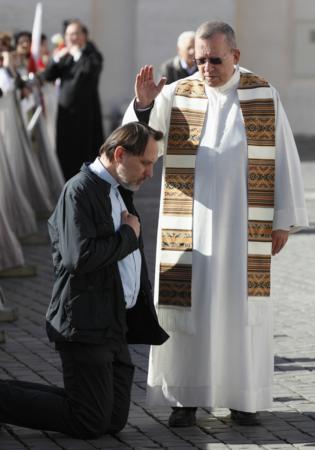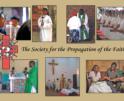
Faith
Our call to repentance is really our call to conversion. It is our call to change, but to become our most authentic selves and children of God.
As we enter Lent we are welcomed by the phrases "repent and believe in the Gospel" or "you are dust and to dust you shall return." These words are spoken as a cross of ashes is placed on our foreheads.
As Catholic Christians this is a time to understand our call to repentance. This call is one to an honest and authentic understanding of our self and of God. Our repentance is what reminds us that we are "dust." In this there is great freedom.
We are called to see our own smallness and weakness. In so doing we recognize God's mercy, love and greatness. It is the call that orients us toward the good news, the Gospel.
In the Exsultet sung to the light of Christ at the Easter Vigil, we hear "O truly necessary sin of Adam, destroyed completely by the Death of Christ! O happy fault that earned so great, so glorious a Redeemer!"
We see at the close of Lent this beauty of the paradox of our journey of repentance: In the midst of our faults we come to know more profoundly the love of God. Repentance then is to live within the dialogue of salvation.
This dialogue is not just to sit and wallow in guilt or shame waiting for and begging on God's love. Nor is it simply to acknowledge God's love and see no compulsion for change and conversion.
Rather it is a constant movement of our hearts to God for he is always reaching for us. It is an encounter with an honest assessment of ourselves and a deep trust in what God can do in us. This repentance is a process, something we return to over and over again.
Our call to repentance is really our call to conversion. It is our call to change, but to become our most authentic selves and children of God.
We know who we are in God when we turn to face God, to point ourselves toward God. The act of repentance is really a practice for our whole journey of conversion. To repent is to return to our Creator from whom we have strayed.
Repentance is inspired by God's grace and love, for as John the Evangelist tells us in his first letter, "We love because he first loved us" (4:19). Even our movement toward God is because of his grace, as St. Augustine preached.
God is always waiting for us to turn toward him. In the parable of the prodigal son, we see a loving father who always waits for the return of wayward children. He rejoices in our return.
To return, however, requires us to see the state of our lives honestly and to be able to give voice to what has burdened us and what we have done.
God does not simply wait for us. He initiates this dialogue. He searches for us. In Genesis when Adam and Eve are disobedient, though they hide in shame, God comes looking for them.
Although they try and clothe themselves with fig leaves, God wraps them in skins. God does not remove the consequence of their sin as Adam and Eve still leave the garden. However, he pursues them, clothes their shame and gives them the tools to return to him.
This is in part the value of the pillars of Lent: prayer, fasting and almsgiving. Each of these elements reminds us of our constant dependency on God.
Although we may see our brokenness, we also see more clearly God's grace. When we know we have been pursued by his love and we have returned to it, we also see the importance of modeling this in our own relationships.
We cannot force the other to return to us, but we can always offer open arms. We cannot hide from those we have wronged, but rather can speak in honesty and truth.
Our Lenten journey helps us to see ourselves and God more clearly, that we may see one another and live a life of conversion that extends far beyond the joyous hope we know at Easter.
FATHER GOLDEN, A NORBERTINE PRIEST, WRITES FROM ALBUQUERQUE, NEW MEXICO.
Recent articles in the Faith & Family section
-
Did you know?Father Robert M. O'Grady
-
Sowing the Seeds of FaithMaureen Crowley Heil
-
Bread left overScott Hahn
-
Scripture Reflection for July 28, 2024, Seventeenth Sunday in Ordinary TimeJem Sullivan
-
What the universal call to holiness entailsDr. R. Jared Staudt





